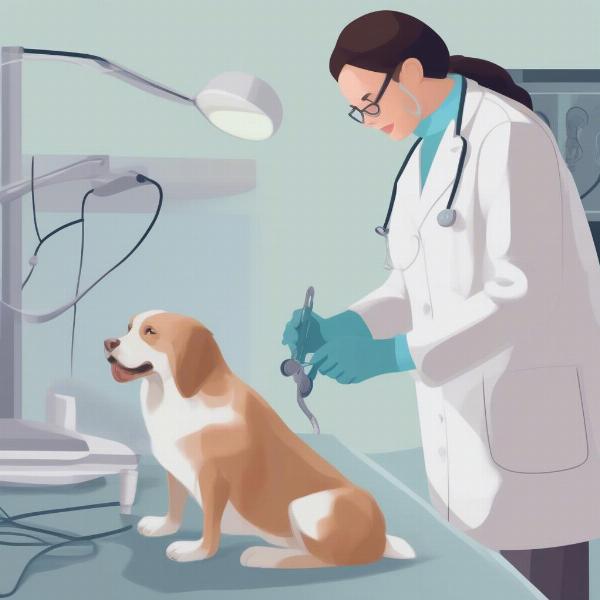Paragard Allwormer is a broad-spectrum dewormer for dogs, effective against various internal parasites. Understanding its usage, benefits, and potential side effects is crucial for responsible dog ownership. This guide provides a comprehensive overview of Paragard Allwormer for dogs, equipping you with the knowledge to protect your furry friend from these harmful parasites.
Understanding the Importance of Deworming Your Dog
Intestinal worms can significantly impact a dog’s health, causing a range of symptoms from mild discomfort to severe illness. Regular deworming is a vital part of preventative healthcare for dogs of all ages and breeds. Paragard Allwormer, with its broad-spectrum action, offers a convenient solution for protecting your dog from these common parasites.
What is Paragard Allwormer?
Paragard Allwormer contains the active ingredient praziquantel and pyrantel, effective against roundworms, hookworms, whipworms, and tapeworms. These parasites can cause various health issues in dogs, including diarrhea, vomiting, weight loss, and anemia. By administering Paragard Allwormer as recommended, you can safeguard your dog from these potentially harmful infections.
How to Administer Paragard Allwormer
Paragard Allwormer is available in tablet form. The dosage is determined by your dog’s weight, and it’s crucial to follow the instructions provided on the product packaging or as advised by your veterinarian. Administering the correct dosage is vital for the dewormer’s effectiveness and to minimize the risk of side effects.
Potential Side Effects of Paragard Allwormer
While generally safe, Paragard Allwormer can sometimes cause mild side effects such as vomiting, diarrhea, or loss of appetite. These side effects are typically transient and resolve without intervention. However, if you observe any concerning symptoms or if the side effects persist, consult your veterinarian immediately.
When to Deworm Your Dog with Paragard Allwormer
Puppies are particularly susceptible to worms and should be dewormed starting at a young age, typically around two weeks old. Adult dogs should be dewormed regularly, typically every three months, or as recommended by your veterinarian. The frequency of deworming can depend on your dog’s lifestyle, environment, and risk factors.
 Veterinarian Examining a Dog
Veterinarian Examining a Dog
Prevention is Key: Beyond Deworming
While Paragard Allwormer is an effective tool for treating intestinal worms, preventative measures are crucial. Regularly cleaning your dog’s living area, picking up feces promptly, and preventing your dog from consuming contaminated food or water can significantly reduce the risk of worm infestation.
Conclusion
Paragard Allwormer is a valuable tool in protecting your dog from the harmful effects of intestinal parasites. By understanding its usage, benefits, and potential side effects, you can make informed decisions regarding your dog’s health. Remember, regular deworming, combined with preventative measures, is essential for maintaining your dog’s overall well-being.
FAQ
- How often should I deworm my dog with Paragard Allwormer? Typically, adult dogs should be dewormed every three months, or as advised by your veterinarian.
- Can I give Paragard Allwormer to my pregnant dog? Consult your veterinarian before administering Paragard Allwormer to a pregnant or lactating dog.
- What should I do if my dog vomits after taking Paragard Allwormer? If your dog vomits shortly after taking the medication, consult your veterinarian for advice.
- Are there any alternatives to Paragard Allwormer? Yes, there are other deworming medications available. Your veterinarian can recommend the most suitable option for your dog.
- Can I buy Paragard Allwormer over the counter? Availability varies depending on your location. Consult your veterinarian or local pet store.
- How can I prevent my dog from getting worms? Regularly cleaning your dog’s living area, picking up feces promptly, and preventing your dog from consuming contaminated food or water are essential preventative measures.
- What are the symptoms of worms in dogs? Symptoms can vary but may include diarrhea, vomiting, weight loss, a pot-bellied appearance, and anemia.
ILM Dog is a leading international website dedicated to providing expert advice on dog care and well-being. We offer a wealth of information on various aspects of dog ownership, including breed selection, health and medical care, training, nutrition, grooming, exercise, and much more. For professional guidance and support on all things dog-related, contact us at [email protected] or call us at +44 20-3965-8624. Visit ILM Dog for more expert advice and resources.